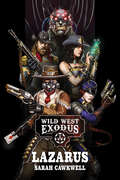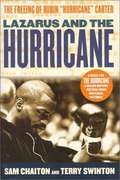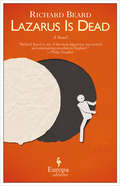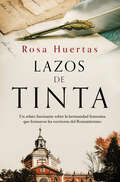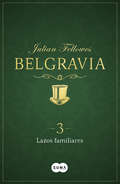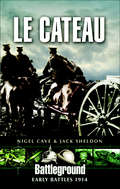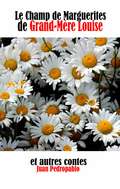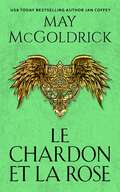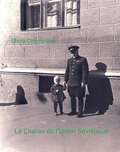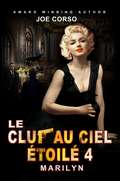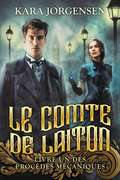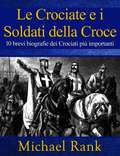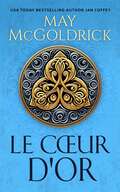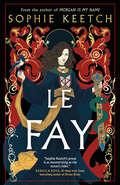- Table View
- List View
Lazarus
by Sarah CawkwellWelcome to an alternate 1870s where the heroism and hubris of humanity in this era of steam and steel have unlocked secrets that the world was unprepared for, as super-science and alien technologies bring about an exciting and unpredictable age. The Dystopian Age.
Lazarus And The Hurricane: The Freeing Of Rubin Hurricane Carter
by Sam Chaiton Terry SwintonThis remarkable true story begins in a Brooklyn ghetto when a group of Canadians meet Lesra, an illiterate black teenager who won their hearts. They bring Lesra to Toronto to help with his education. While learning to read, Lesra finds a copy of Rubin Carter's The Sixteenth Round. Rubin Carter, the subject of Bob Dylan's song "Hurricane", was a #1 middleweight boxing contender who had been wrongfully imprisoned after a white jury found him guilty of the murder of three whites in 1966. A huge public outcry followed the publication of Carter's memoir The Sixteenth Round in 1974, culminating in a retrial, which was a virtual reenactment of the original travesty, with Carter receiving the same triple-life sentence. Inspired by Lesra's passion, his adopted Canadian family made contact with Carter and reinvigorated the legal battle. The Hurricane is the moving story of the eight year struggle Carter and his Canadian friends waged to win his exoneration and freedom.
Lazarus Is Dead: A Novel
by Richard BeardThis story of Jesus&’s childhood best friend is &“a thrilling meta-novel&” and one of Kirkus Reviews&’ Best Books of the Year (Maria Semple, author of Where&’d You Go, Bernadette). Like most successful men in their early thirties, Lazarus has plans that don&’t involve dying. He is busy organizing his sisters, his business, and his women. Life is mostly good until far away in Galilee, without warning, his childhood best friend, Jesus, turns water into wine. Immediately, Lazarus falls ill. And with each subsequent miracle his health deteriorates: a nasty cough develops into an alarming array of afflictions unresponsive to the usual remedies. His sisters think Jesus can help, but the two men haven&’t spoken for years. Lazarus is willing to try anything to make himself well, anything, that is, except ask Jesus for help. Lazarus dies. Jesus weeps. Lazarus rises. This part we all know. But Lazarus is about to discover that returning from the dead isn&’t easy at all . . . An ingeniously funny and moving novel disguised as biography, Lazarus Is Dead recounts the story of a great friendship lost and regained that unabashedly turns convention on its head. Richard Beard draws on biblical sources, historical detail, art, and contemporary literature to cast a spell that remains unbroken until the final pages of this story about second chances. &“Beard&’s take on Lazarus is nothing less than astonishing—and he respects the reader by taking religion and religious questions seriously.&” —Kirkus Reviews (starred review) &“Thoroughly entertaining . . . a brilliant, genre-bending retelling and subversion of one of the oldest, most sensational stories in the western canon.&” —Sunday Business Post (Ireland) &“Clever and original . . . keeps the reader guessing until the death—and beyond.&” —The Financial Times
Lazos de tinta
by Rosa HuertasUn retrato revelador sobre la primera asociación de mujeres literatas en el Madrid del siglo XIX. Manuela ha crecido en la pobreza. Hija de una lavandera y de un indeseable, ha sufrido las penurias de una ciudad donde el abismo entre las clases sociales es insalvable. Sin embargo, gracias a una vecina, Manuela tiene algo que la mayoría no posee: sabe leer. Cuando su madre muere y ella huye de un padre que quiere abusar de su poder y utilizarla, su camino se cruza con el de una joven escritora, Gertrudis Gómez de Avellaneda. Criada en una familia con medios, rebelde y sabiéndose siempre distinta a las jóvenes de su clase que únicamente aspiran a casarse y situarse en sociedad, Gertrudis no solo piensa en leer y escribir, sino que tiene la osadía de querer publicar. Logrará contactar con otras que, como ella, se saben diferentes y están dispuestas a hacer oír sus voces. Así nacerá la Hermandad Lírica, un grupo de mujeres intelectuales unidas por la pasión por el saber y los libros y por la necesidad de reivindicar sus obras frente a aquellos escritores cuyos nombres sí aparecen en los libros de historia. La vida de Manuela y la de Gertrudis quedarán entrelazadas para siempre a caballo entre un Madrid frío y cerrado a los cambios y las otras ciudades donde buscarán esa libertad que ansían contra viento y marea.
Lazos familiares (Belgravia #3)
by Julian FellowesBelgravia, del creador de Downton Abbey, Julian Fellowes, es una historia publicada en 11 capítulos en la mejor tradición de las novelas por entregas. En esta tercera entrega, Lord y lady Brockenhurst ejercen como anfitriones de unos problemáticos familiares mientras los Trenchard reciben una invitación inesperada. Muy cerca de Buckingham Palace, tras las puertas de las grandes mansiones del Londres victoriano reinan el escándalo y la intriga. Bienvenidos a Belgravia. Ambientada a mediados del siglo XIX, en una sociedad victoriana en la que los nuevos ricos de la industria y el comercio comienzan a codearse con la más arraigada aristocracia, Belgravia está poblada por un rico reparto de fascinantes personajes. Esta es la historia de un secreto. Un secreto que se oculta al otro lado de las elegantes puertas del barrio más exclusivo de Londres. Su historia será desvelada en capítulos sucesivos llenos de giros, revelaciones y finales inesperados. La crítica ha dicho...«Simplemente una lectura maravillosa. [...] Un clásico moderno que llenará el hueco que dejóDownton Abbey.»Daily Express
Le Belle Ragazze In Attesa: Un'avventura di Helena Brandywine (Helena Brandywine #1)
by Greg AlldredgeCi sono mostri che sono ancora umani. In una magica San Francisco del 1899, il nuovo millennio è alle porte. Ovviamente le nuove invenzioni sono all'ordine del giorno, alcune sono magnifiche, altre mondane mentre tra le strade fioccano nuovi omicidi ogni notte. Sullo sfondo di questa ambientazione una ragazza dell'alta borghesia scompare e la giovane e intraprendente Helena Brandywine si avventura, insieme alle sue guardie del corpo, per scoprire cosa è successo. La ragazza era forse in fuga dai Tong di Chinatown? Che orrori deve aver dovuto sopportare? Riscopri l'Età d'Oro mentre Helena svela i segreti della sua famiglia. Il bene e il male, dove il pericolo è dietro ogni angolo. Riuscirà Helena Brandywine ad affrontare gli orrori che porterà alla luce? Venite a cercare le Belle Ragazze in Attesa Libro primo di nove della serie di Helena Brandywine
Le Boogie Woogie: Inside an After-Hours Club (The Cosmopolitan Life)
by Terry WilliamsThe “after-hours club” is a fixture of the African American ghetto. It is a semisecret, unlicensed “spot” where “regulars” and “tourists” mingle with “hustlers” to buy and use drugs long after regular bars are closed and the party has ended for the “squares.” After-hours clubs are found in most cities, but for people outside of their particular milieu, they are formidably difficult to identify and even more difficult to access.The sociologist Terry Williams returns to the cocaine culture of Harlem in the 1980s and ’90s with an ethnographic account of a club he calls Le Boogie Woogie. He explores the life of a cast of characters that includes regulars and bar workers, dealers and hustlers, following social interaction around the club’s active bar, with its colorful staff and owner and the “sniffers” who patronize it. In so doing, Williams delves into the world of after-hours clubs, exploring their longstanding function in the African American community as neighborhood institutions and places of autonomy for people whom mainstream society grants few spaces of freedom. He contrasts Le Boogie Woogie, which he visited in the 1990s, with a Lower East Side club, dubbed Murphy’s Bar, twenty years later to show how “cool” remains essential to those outside the margins of society even as what it means to be “cool” changes. Le Boogie Woogie is an exceptional ethnographic portrait of an underground culture and its place within a changing city.
Le Cadeau de Lyon
by Tanya Anne Crosby Angélique Olivia MoreauSes prouesses sur le champ de bataille lui ayant valu le surnom de Lyon, Piers de Montgomerie veut relever le défi du roi David : écraser la rébellion scot. En contrepartie, il accepte des terres contestées et découvre rapidement que ce qu'il désire vraiment est la beauté des Highlands dont les frères lui refuseront toujours allégeance. Meghan Brodie refuse d'être le pion d'un jeu politique et jure de ne pas se laisser conquérir si facilement. Elle résiste au lion anglais... mais lorsqu'elle se rend compte que leur amour pourrait apaiser une terre meurtrie, osera-t-elle espérer que Lyon verra au-delà de sa beauté et aimera la jeune fille imparfaite qu'elle est vraiment ?
Le Cateau (Battleground Early Battles 1914)
by Nigel Cave Jack SheldonLe Cateau (26–27 August 1914) was the second major action fought by the BEF in the Great War. His men exhausted after fighting at Mons and by the subsequent speedy retreat, Lieutenant-General Horace Smith-Dorrien (commanding II Corps) decided that he had to make a stand in the vicinity of Le Cateau.There his men took on elements of four German corps in an action that succeeded in giving the BEF a respite, but at considerable cost. Amongst other elements of controversy in the conduct of the battle was the handling of the Royal Artillery.The battle also undermined the already fraught relationship between Smith-Dorrien and the BEF's commander, John French. The battlefield today remains largely as it was, open countryside, and it is an ideal location to view one of the most significant British battlefields of the early days of the war.In this action no less than five Victoria Crosses were won, three of them in one howitzer battery and two by men of the 2nd King's Own Yorkshire Light Infantry.
Le Champ de Marguerites de Grand-Mère Louise et autres contes: Usa , From Unknown To Today (D Day Ser.)
by Mandy Bernardini Juan PedropabloLe doux parfum du champ de marguerites de Grand-mère Louise, fleurs qui, paradoxalement, comme tout le monde le sait, n’a pas de parfum, a jeté à tout le village un étrange sortilège. À la lecture, la frontière entre le magique et le réel se dissipent presque de la même façon que le souvenir d’un rêve au moment du réveil. Dans cet ouvrage, des crapauds mystérieux, une rigueur séculaire et ridicule d’écouter des coquillages, la fin du monde, le péché de fumer et de ludiques souvenirs de l’enfance, côtoient des poèmes du quotidien écrits au nom de l’amour. Au nom du véritable amour, avec ses millions d’histoires et de noms. Il s’agit d’une saga inédite où même le Destin et le Karma sont des éléments de la magie présente au sein d’un récit que l’auteur a magistralement élaboré. Le champ de marguerites de Grand-mère Louise et autres contes, est une promesse de lecture rapide et de promenade à travers divers lieux psychologiques et philosophiques de l’être humain. Mais il s’agit surtout d’une lecture très humaine…
Le Chardon et la Rose (Macpherson Series)
by Jan Coffey May McGoldrickUne romance intemporelle et tumultueuse dans les Highlands, au milieu du chaos de la guerre ! Tromperie Désespérée Celia Muir doit s'échapper d'un château en flammes dans les Highlands écossais avant que les soldats anglais ne la capturent. Elle est accompagnée d'amis et de serviteurs loyaux, tous unis pour protéger l'enfant Kit d'ennemis inconnus. Pour que sa mission clandestine réussisse, elle doit faire croire à Colin Campbell, le seigneur guerrier dont elle sollicite l'aide, qu'elle est la séduisante Lady Caithness. Un Désir Irrésistible La tête de Colin Campbell lui dit que cette femme Caithness est un problème, mais son cœur lui dit qu'elle est magnifique. Il a besoin de savoir ce que Celia cache, mais il veut aussi la prendre dans ses bras et l'embrasser. Alors que la guerre avec l'Angleterre embrase les collines couvertes de bruyère, Colin et Celia trouvent des raisons de dévoiler leurs secrets, de s'abandonner à leurs désirs et de se diriger vers un destin où l'avenir de l'Écosse - et le leur - reposera sur la force de leur passion et de leur amour...
Le Charon de l'Union Soviétique
by Elena ChernikovaLe texte raconte l'histoire du grand-père de l'auteur, un homme ayant vécu des moments clés de l'histoire russe, y compris la chute de l'Union soviétique. Après la mort de sa femme, il décide de profiter pleinement de la vie, oubliant la mort et se concentrant sur des expériences positives, comme un rendez-vous chez le coiffeur. Le récit explore les changements sociaux et personnels à travers les yeux de cet homme ayant traversé de nombreuses épreuves et transformations.
Le Club du ciel étoilé
by Joe Corso Fotsing fils de FongangUn roman qui met en scène une très grande vedette de cinéma connue sous le nom de Marilyn Monroe et un chef de la mafia appelé Red Fortunato.Les deux ont été victimes d'une tentative d'assassinat par les fédéraux.
Le Coffre au Trésor de Docteur Margaret
by Waheed Rabbani Isabelle WeissmannUne jeune américaine, Margaret Wallace, épouse son cousin canadien, officier de cavalerie, et le suit en Crimée, lors de la guerre de 1854, puis se rend en Inde où elle s'implique dans la mutinerie / rébellion hindoue de 1857...
Le Combat d'Ève- Opération Serrurier
by Hannah HoweLes personnages du Combat d’Ève sont fictifs. Cependant, toutes les histoires et les incidents qu'elles contiennent, du personnel au public, sont basés sur des faits réels.Le Combat d’Ève est une série de douze livres, chaque livre ayant environ 20 000 mots et un écart de publication de deux mois. À la fin de chaque livre, vous trouverez des biographies des véritables héros et héroïnes notamment ceux des personnages incarnés par Eve Beringar, Guy Samson et Mimi Duchamp. Çà été un honneur de lire des histoires sur des personnes pleines de dignité et essentiellement courageuses. J’ose croire que vous serez épris par leurs parcours dans le Combat d’Ève.
Le Comte de Grayson: -
by Amanda MarielIls risquent non seulement de perdre leur réputation, mais surtout, leur cœur. Damien Archer, le Comte de Grayson et Madame Charlotte Lawson sont opposés à tous points de vue. Là où sa coloration est sombre, elle a des cheveux blonds et des yeux bleus. Le teint d'albâtre de Charlotte est un contraste frappant avec le bronzage de Damien. Il est grand à six pieds trois pouces tandis qu'elle est petite (à peine plus d'un mètre cinquante). De plus, son tempérament joyeux contraste fortement avec sa nature sombre. Mais le plus gênant est sa tendance à faire fi des règles de la société alors qu'elle les suit sans faillir. Damien ne désire rien d'autre que de passer son temps à faire la fête, à boire et à jouer, tandis que Charlotte passe le sien à prendre le thé, à aller à des bals et à assister à des comédies musicales. Elle est une vraie Dame et lui un râteau déterminé. Lorsque leurs chemins se croisent, ils ont toutes les raisons de se tourner dans la direction opposée, et pourtant ils ne semblent pas pouvoir s'éviter. Les passions s'enflamment, les mettant tous deux en danger. Ils risquent non seulement de perdre leur réputation, mais aussi, et surtout, leurs cœurs.
Le Comte de Laiton (Livre Un des Procédés Mécaniques)
by Elise Delahaye Kara JorgensenLord Sorrell cherche la liberté. Ecrasé par les responsabilités du comté et par un père autoritaire, le jeune homme s’enfuit en Orient, mais il est assailli par la peur de se retrouver à tout jamais cloué au sol lorsqu’un accident imprévisible lui coûte son bras. En proie à la dépression face à une vie si restrictive, Eilian Sorrell part à la recherche de la complétion, au moyen d’un nouveau bras. La boutique des Prothèses des Frères Fenice est en danger. Le frère d’Hadley vient de perdre la vie, et la survie de toute l’échoppe retombe alors sur ses épaules. Les clients lui détournent dès lors le dos, et elle ne peut s’empêcher de bientôt craindre de devoir mettre la clé sous la porte, à moins de ne se déguiser en homme. Cependant, tout le monde n’est pas dupe. En échange de son nouveau bras, Lord Sorrell lui offre la chance de découvrir l’indépendance dans les déserts de la Palestine. Ce qu’ils y découvriront sera bien plus précieux que tous les ossements et toutes les poteries du monde. Le désert recèle des secrets qui valent plus que leur poid en os. Hadley et Lord Sorrell en réchapperont-ils en vie ou seront-ils à leur tour enterrés dans une tombe de sable ?
Le Comte d’Edgemore: - (FICTION / Romance / Régence #2)
by Amanda MarielNoël n'a jamais été aussi méchant … Le comte d'Edgemore, Blake Fox, n'en fait qu'à sa tête et il n'a pas l'intention de s'en excuser. Son seul point faible est sa sœur, Madame Minerva. Il est loin de se douter que la garce a en tête de faire des rencontres et que Noël est l'occasion idéale. Blake a-t-il une chance contre sa sœur indiscrète, le gui et la magie de Noël ?
Le Consul Infiltré
by Esteban Navarro SorianoLe 2 novembre 1972, trois jeunes communistes s’introduisaient dans le consulat de France de Saragosse et provoquaient un incendie qui eut raison de la vie de Roger Tur, consul honoraire de France. Des années plus tard, lors du déclassement des archives de la CIA, il fut révélé que durant la guerre le consul avait espionné les nazis et remis de rapports aux américains.
Le Corbusier in Detail
by Flora SamuelThis is the first book to give such close attention to Le Corbusier's approach to the making of buildings. It illustrates the ways in which Le Corbusier's details were expressive of his overall philosophical intentions. It is not a construction book in the usual sense- rather it focusses on the meaning of detail, on the ways in which detail informs the overall architectural narrative of a building. Well illustrated and containing several specially prepared scaled drawings it acts as timely reminder to both students and architects of the possibilities inherent in the most small scale tectonic gestures.
Le Corbusier's Chandigarh Revisited: Preservation as Future Modernism
by Vikramaditya PrakashWhat is the relevance of the Chandigarh experiment today? Written by an esteemed scholar and former resident of the city, this fascinating book reevaluates Le Corbusier’s work in Chandigarh in terms of the pressing challenges of the present, in particular climate change, globalization, neo-nationalism, and information technology. Through a lively poststructuralist and postcolonial framework, this book explores issues of preservation, identity, meaning, and change, comparing how the Chandigarh we see today compares to the original plans and drawings. But this book also asks whether Chandigarh’s aesthetics, as well as the ethical tenets on which it was based, are still relevant to urban planning and architecture today. What lessons, if any, does the utopian ethos within modernism offer in the face of the climate crisis, rising authoritarianism, and the digital explosion? Via chapters focused on the hydrologics of the master plan, the symbolism of the Capitol buildings, and the archeology of the unbuilt Museum of Knowledge, this book makes the future-preservation case for Chandigarh as an ‘open’ work, a project that was set up by design to be ‘completed’ by others in times yet to come. Engaging and erudite throughout, this book will appeal to any student, scholar, or professional with an interest in architecture, landscape architecture, and urban planning.
Le Crociate e i Soldati della Croce: 10 brevi biografie dei Crociati più importanti
by Michael Rank Laura Fenati"Le Crociate e i Soldati della Croce" è un nuovo emozionante libro dello storico e brillante autore Michael Rank riguardante i tentativi effettuati di riconquistare la Terrasanta. Sono trattate la vita e le epoche dei 10 più famosi personaggi vissuti in uno dei periodi più interessanti della storia: dal 1095 al 1212. Che si sia trattato di Pietro l'Eremita che radunò un esercito di 100 mila contadini per combattere nelle Crociate in Terrasanta armati di null'altro che forconi, oppure di Baldovino IV che guidò personalmente il suo esercito contro Saladino nonostante la lebbra terminale che l'affliggeva, queste straordinarie figure si videro costrette ad abbandonare le loro grandi proprietà terriere per imbarcarsi in una pericolosa avventura contro un nemico più potente. Questo libro esaminerà le motivazioni addotta da ciascuno di questi 10 personaggi che si unirono alle Crociate. Si trattò forse di ricavare gloria in battaglia, come per Riccardo Cuor di Leone. Per altri si trattò di semplice curiosità, come per Eleonora d'Aquitania, che volle ostentare la sua partecipazione facendosi seguire da un corteo di 300 serve abbigliate con armature decorative e lance durante la marcia su Gerusalemme. Per molti altri fu una mera questione di fede, come le migliaia di crociati bambini che, secondo la leggenda, marciarono verso il Mar Mediterraneo credendo che le acque si aprissero come accadde per il Mar Rosso con Mosè. Qualunque sia stata la loro motivazione, questi 10 personaggi delle Crociate dimostrano che una persona intenzionata ad affrontare un viaggio enormemente pericoloso verso terre di un continente diverso, disponeva di una personalità adatta ai tempi affascinanti nei quali visse. Informazioni di vendita: questo libro ha fatto registrare ottime vendite nel corso degli ultimi 18 mesi, attestandosi al n. 2000 della classifica Amazon Kindle.
Le Cœur d'Or (Famille Macpherson)
by Jan Coffey May McGoldrickAuteur de best-sellers USA Today Lauréat du Holt Medallion pour la meilleure romance historique Des côtes sauvages des îles occidentales de l'Écosse aux champs sanglants de France, en passant par les cours brillantes d'Europe, la série Macpherson suit la lutte d'une famille pour l'indépendance de l'Écosse contre le roi des Tudor, Henri VIII. RITE DE PASSION Lors du tournoi des deux rois, Elizabeth Boleyn attire non seulement le regard d'Henry Tudor, mais aussi celui du guerrier écossais Ambrose Macpherson, dont l'offre audacieuse pourrait être son unique salut... QUÊTE D'AMOUR Ambrose Macpherson est attiré par la fille du diplomate anglais. Le fait que le roi anglais détesté la convoite fait d'Elizabeth un enjeu encore plus précieux. Mais après avoir été témoin d'un acte de trahison qui pourrait renverser la couronne, Elizabeth disparaît. Ambrose sait que le destin ne lui laissera aucun répit tant qu'il ne l'aura pas retrouvée...
Le Disavventure di Lady Ophelia (Le Intrepide Debuttanti #3)
by Christina McKnightLady Ophelia Fletcher, tranquilla e riservata, ha sempre il naso ficcato in un libro; perciò non ha assistito alla morte della sua amica quella fatidica notte. Ora scrive la rubrica del Mayfair Confidential per denunciare gli uomini poco raccomandabili e fare ammenda per non aver supportato le accuse di omicidio fatte dall’altra sua amica. Quando un affascinante straniero arriva per incontrare suo padre, Ophelia non può fare a meno di indagare su quell’irresistibile lord. Colin Parnell, Lord Hawke, ha una promessa da mantenere: trovare il libro che dimostra che il nonno lavorava come spia per il re Giorgio II e non è morto da contrabbandiere buono a nulla al largo delle coste del Kent. Avvolti dal mistero e dallo scandalo, i membri della famiglia Parnell sono in guerra gli uni con gli altri da decenni, e Colin è determinato a porre fine a tutto ciò trovando le prove del passato onorevole della famiglia. Sfortunatamente, il libro che cerca è nelle mani di una fanciulla dai capelli rosso fuoco, e dovrà assicurarsi l’aiuto di Ophelia per scoprire la verità. Ophelia è più che felice di usare le sue abilità per aiutare Lord Hawke. Ma la loro ricerca di risposte li condurrà a una disavventura, o scopriranno qualcosa di più grande di ciò che si aspettavano: la verità e i sentimenti che provano l’uno per l’altra?
Le Fay (The Morgan le Fay series #2)
by Sophie Keetch"A very real, passionate retelling of Morgan le Fay's story, with detail about political and magical lives, and the women who are such a vital part of the tale." —Tamora Pierce, #1 New York Times bestselling authorFrom the author of Morgan Is My Name comes the second installment in the Morgan le Fay trilogy, a feminist retelling of the story of the formidable and misunderstood villainess of Arthurian legend, Morgan le Fay.Having escaped an unhappy marriage, Morgan finds herself in Camelot—the city of dreams and peace. Her brother, King Arthur, treats her as a valued advisor and Morgan finally has recognition befitting her intelligence within his trusted circle, despite a longstanding conflict with Queen Guinevere.But Morgan&’s life is not without complications. Between a vengeful husband determined to snatch their son away, the strict ideals of court life and a jealous rival for Arthur&’s attentions in the sorcerer Merlin, gaining true power and freedom is a greater challenge than Morgan envisioned. And when a face from her past arrives at Camelot, bringing old memories and new desires, the future that she has planned becomes fraught with danger.Morgan must break the shackles of expectation to seek true happiness. But at the risk of destroying everything she&’s worked so hard to gain, what is she willing to sacrifice for control over her life?
